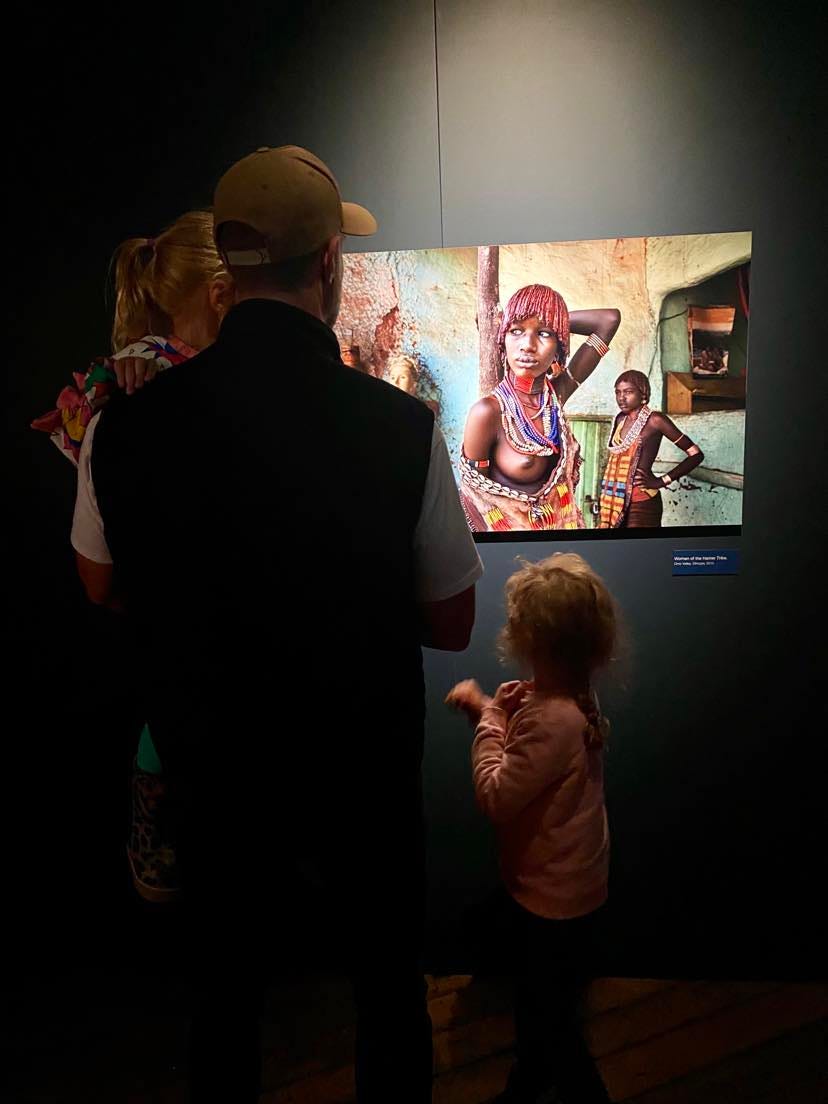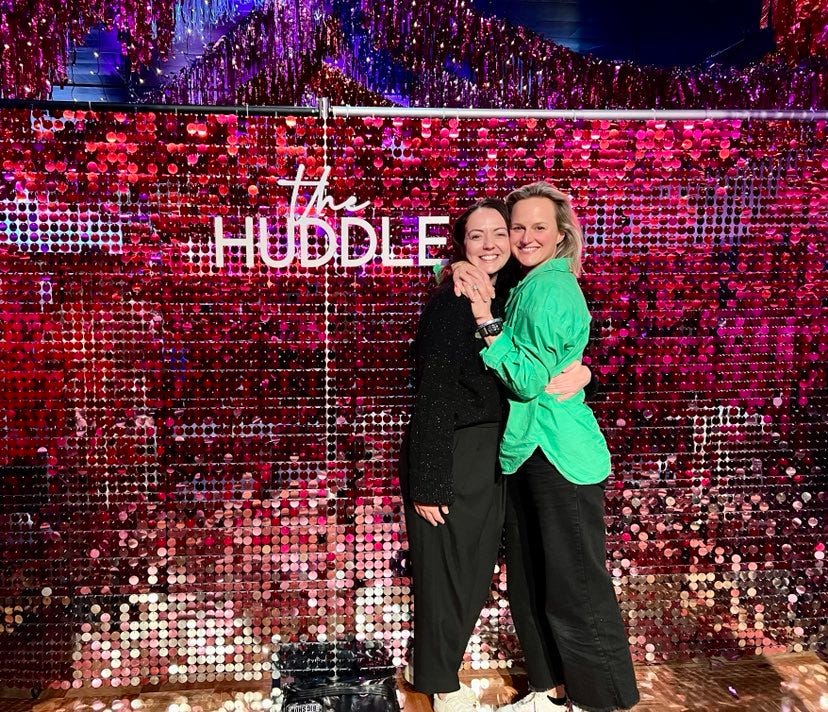Be a Lobster, the Price We Pay to Be ‘Good’ + Lessons From a Night With Jennifer Coolidge
An evening with The White Lotus besties was not what I expected.
Be a lobster.
This is the rather peculiar invitation I received while attempting a meditation on the Calm app the other night. The soothing voice of Tamara Levitt encouraged me to find my breath. Settle in. No mention of lobsters or any other form of marine crustaceans.
Tamara did start talking about walls. Protective walls. The walls we build around ourselves when we feel vulnerable or scared.
“We’ve all held ourselves back from new experiences due to fear of failure, embarrassment or rejection. It's normal to want to feel safe and comfortable so we build emotional walls… during difficult times protective walls can be useful and helpful to heal… but once the challenge has passed, it’s important to shed away the protective layer we no longer need, otherwise it keeps people and experiences out and keeps us locked in and holding us back from our growth.”
And then… the lobster talk:
“Dr. Abraham Twerski compares our emotional walls to the shell of a lobster. As a lobster grows the casing that protects his soft inner flesh is too tight and rigid. The shell that once held it secure now holds it back from growth. So the lobster must free himself. This can take a while, and during this vulnerable time his tender flesh absorbs seawater, and he gets bigger and heavier and grows a new shell, until this new one feels too tight, and the lobster does it all over again.”
Food for thought, indeed. The meditation went on to ask if we could be aware of these walls and consider how they protect us and how they hold us back. And to explore the possibility of cracking the shell, like the lobster… and perhaps free ourselves to a new adventure.
So, I’ve been trying to be more like a lobster. This involves practising sitting in the discomfort, rather than wanting to run or hide! Trying to lean in and be curious and nurturing, rather than panicked or annoyed by it all.
And it seems I’m not the only one who’s trying to be a lobster - or who can relate to what Brené Brown calls ‘The Midlife Unravelling’. In my new podcast episode I chat with Elise Loehnen who is a writer, editor and podcast host, and was the chief content officer of goop, where she co-hosted The goop Podcast and she also co-hosted The goop Lab on Netflix.
Elise is also the author of the newly released and instant New York Times bestseller On Our Best Behavior: The Seven Deadly Sins and the Price Women Pay to Be Good. It is soaring up the charts.
We start our conversation with Elise talking me through a period at the end of 2019, when she was feeling inadequate and exhausted, and contending with consuming anxiety and panic. She realised the way she was living her life simply could not be sustained.
Elise came to recognise that, like so many of us, she was using work - and a ramped up level of busyness - as a tool to numb and to keep her fears at bay.
Through the process of writing this book, and ultimately changing her life, Elise learnt the value of sitting in the discomfort, re-connecting to our inner knowing, prioritising rest, and interrupting our social conditioning.
BIG TIP: Keep listening towards the end of our chat where Elise shares her simple steps to get really clear on our basic needs, wants and who it is that we want to be, as a person. It involves a spreadsheet - but is far more exciting than that may sound. I promise.
It’s been some time since the previous newsletter. In between surviving a good ole family bout of COVID, like everyone else I know, and soaking up the final moments of Ted Lasso and Succession, Ben and I took the kids to the stunning Steve McCurry ICONS exhibition. Ben and I were in Ethiopia’s Omo Valley in 2012, the same year and photographing the same tribe, as Steve McCurry, who took this stunning photo below. We received such a jolt of energy and inspiration from the exhibition and it was a great reminder of what we’ve seen, and what is still calling.
(You can see our own Hamer Girl portrait over at Habari Productions. Our happy place!)
I also hit the beautiful city of Orange to attend The Huddle, hosted by the brilliantly creative chicks at Jumbled, which was beyond dazzling but also incredibly inclusive and kind. Driving myself home to my bebes through snow, over Victoria Pass in the Blue Mountains, was definitely good practice for being more like that lobster!
(Below: The wonderful Rachel Lees, plus, an award-winning photo wall!)
And finally a true highlight these past few weeks was watching and absorbing the chaotic, yet hilarious and incredibly authentic conversation unfold on stage with The White Lotus star Jennifer Coolidge and her best mate, who also happens to be the show’s creator/director, Mike White. It was as part of Sydney’s Vivid Festival, and you could see these guys' eyes open wide and sort of freak the hell out as they stepped into the spotlight and saw the throbbing crowd - literally packed to the rafters of the ICC - hanging off their every word.
Moderator Benjamin Law did a brilliant job and pulled out his own directing skills, to bring out the very best of Jennifer and Mike. Jennifer spoke about her Renaissance (Jennaissance) and opened up about her personal and professional struggles throughout her 30-year career in Hollywood.
The 61-year-old said she initially rejected Mike’s requests for her to play Tanya McQuoid in The White Lotus, because after lockdown she was wasn’t feeling motivated and was worried about how she would look in a bathing suit on the show’s Hawaiian set. Take a listen:
Jennifer also shared her rules for success and offered her advice for wannabe actors:
Step 1: “When you wake up in the morning, leave the house!” Which made the crowd laugh, but also perhaps gave some insight into the star’s own personal challenges.
In regards to how she feels sexy: “There’s one thing that can keep you forever young and sexy… pure denial.”
And when answering a question from the crowd about how she overcomes self doubt, which both Jennifer and Mike both said they frequently experienced, Jennifer answered:
“One of the best things to cure self -doubt… go to [see] really bad stuff. Plays that are really bad? Go to them. Shows that are bad? Watch them!”
The whole experience was delightful. And not what I expected.
So, let me know if you can relate to being a lobster, or Elise’s book about being on our best behaviour, or the sheer brilliance of Jennifer Coolidge.
Big love,
Steph.








